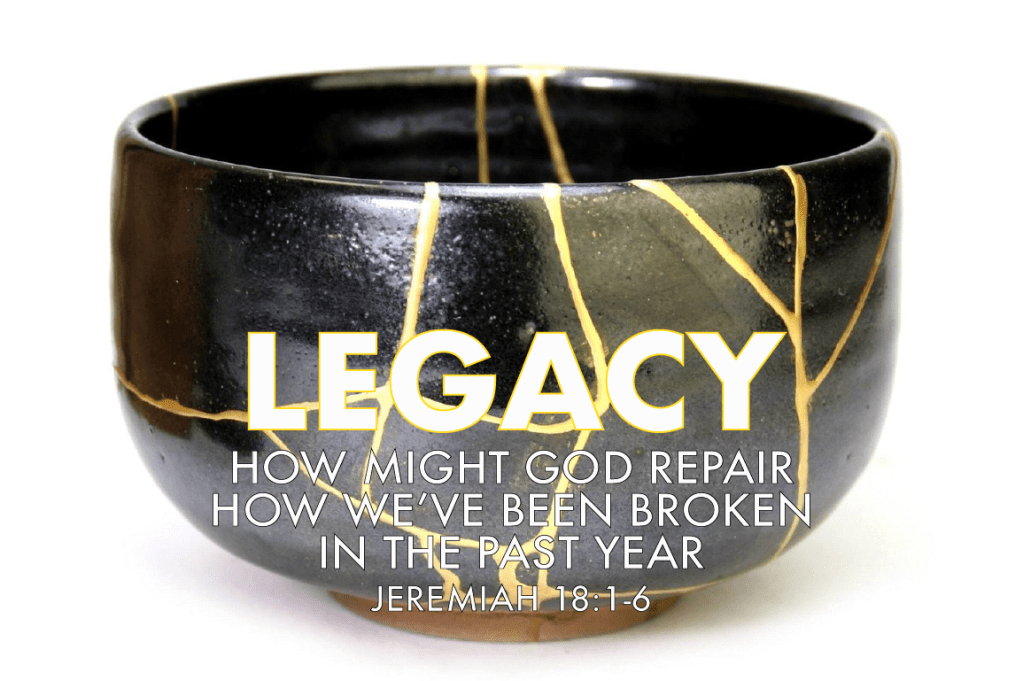Blogging Towards Sunday, May 2, 2021

We’re talking about legacy – which can be both positive and negative – a loaded idea. “First, it means what you leave behind to your heirs (the inheritance or gift). And second, one can also have a terribly negative legacy—the bad stuff that passes on from generation to generation (the effect, the outcome, the awful con-sequence of a personal or family way of being in the world).”
We’re using the Japanese art form and philosophical idea of Kintsugi (金継ぎ) to talk about the legacy of this past year. Kintsugi is the art of repairing broken pottery by mending the areas of breakage with lacquer dusted or mixed with powdered gold. As a philosophy, it’s about embracing flaws, imperfections, “broken-ness” then blessing, keeping, and restoring them – quite possibly even making the item (person, community) stronger.
The prophet Jeremiah was sent by God to interact with a potter who repaired and replaced broken pottery. It was a prophetic action speaking to Israel of what God intended for them as a community in the exile to Babylon. They were broken in a way that only God could repair, restore and make whole.
The story of the opening of the eyes of the blind man by Jesus in Mark 8 tells a story of Kintsugi. A generic group of “some people” bring the blind man to Jesus for help. They must be at their wit’s end, or exhausted all their resources to help this person that they obviously love. They don’t ask Jesus. They beg him. I picture them on their knees, with tears in the eyes and in their quivering voices. Jesus responds by acting. He takes the man by his hand, and uses his saliva as a balm. (Sound gross to us, and it was a commonly practiced therapeutic method in the ancient world).
Then Jesus heals him. But it doesn’t seem to take, or be complete. It takes a second touch of Jesus to open the eyes of the man in totality. What’s that about? Is it because the blindness was so bad? Did the man not know how to articulate his vision? Was there a legacy of brokenness that took extra effort to break down? And then Jesus tells the man not to go back to the village from which he came. Isn’t this the place from which people (maybe his neighbors) brought him? Is there some sort of bad legacy there, or in his life there? He’s then broken open to a new future which requires letting go of the past.
QUESTIONS FOR REFLECTION & EXAMEN:
- What engaged, enraged, or surprised you in the text?
- What broke you this past year?
- What do you want to carry forward from this past year?
- What do you want to shed, like the blind man not returning into the village?
Much thanks to Marji Wilkens for permitting me to quote her words and for her help in shaping my thoughts.

These are wonderful scriptures to reflect on. The Jeremiah verses reveal to me that the pots are all made of clay; all are formed for a purpose, but some are mishapened in the process. Yet, the potter doesn’t throw the clay away, but re-shapes them for their original purpose. No judgment, only reformation! Ironically the potter continues the process of perfection.
The villagers bring the blind man to Jesus! For the first time, I’m imagining that the blind man went to the village, because he was begging for alms. Notice he doesn’t heal the man in the village, but outside, alone. They see that sending him to the healer is easier than doiing what they can for the man, but they miss the imortance of the miracle! What I’m reminded of, it how easy it is to push off the reclamation process, the healing process onto others, and then walk away. Jesus surely heals the man, but then tells him to go back home, which was not the village in the first place, so that he could decide what he would now do with his life, instead of begging.
WHAT I WANT TO CARRY FORWARD FROM THE YEAR; IT’S LEGACY, This has been a year of illness and death, and also of birth and miracles. Even as I feel helpless and powerless in response to the devastation of the pandemic, I am also reminded of the power of God to offer hope and service in the face of fear and despair. I want to shed the paralysis of despair and live with the hope of a better tomorrow.